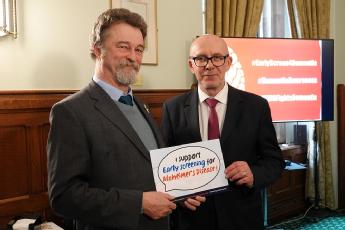News
View the latest news from departments within the Faculty of Science, Engineering and Medicine below.
Faculty of Science, Engineering and Medicine News Read more from Faculty of Science, Engineering and Medicine News
Computer Science News Read more from Computer Science News
Statistics News and Events Read more from Statistics News and Events
Physics Department News Read more from Physics Department News
Professor Sandra Chapman attended the European Geosciences Union (EGU) meeting to receive her Hannes Alfvén Medal.
On Tuesday 16th April, Professor Chapman was presented her award at the annual EGU meeting in Vienna with over 15,000 people in attendance. Sandra also gave a lecture titled ‘Multiscale matters: when coupling across multiple scales drives the dynamics of solar system plasmas.’
News Library Read more from News Library
Life Sciences News Read more from Life Sciences News
Life Sciences Research with Impact
The recently published BBSRC Impact Showcase 2023 presents a collection of impact stories arising from BBSRC investments. The showcase highlights the vital role bioscience has in addressing key strategic global challenges and features research by Professor Eric Holub to develop new varieties of beans compatible with the British Climate.
Find out more (Scroll down the homepage to find 'Homegrown production of designer dry beans').
School of Engineering News Read more from School of Engineering News
WMG News Read more from WMG News
WMG researchers present new Alzheimer’s widespread screening device at parliament
On Wednesday (24th April), WMG at the University of Warwick’s Professor Alan Chalmers, and his research team, held a parliamentary drop-in session, hosted by Sir Jeremy Wright, MP for Kenilworth & Southam and Vice-chair of the all-party parliamentary group on Dementia.
Scientists at WMG, have been working on ground-breaking medical screening for neurodegenerative conditions, with a particular focus on Alzheimer’s disease. The research is based on growing evidence that people suffering with such diseases can lose their sense of smell and taste, many years before other symptoms, such as memory loss, become apparent.
An early diagnosis is critical for those with the disease. New drug technology can slow the progress of Alzheimer’s, but only if detected early enough.
Together with research partners including the NHS, Neurosaliance, and Superlunary Labs, the scientists updated policy makers on the progress of a National Engagement Framework for facilitating screening across the county and demonstrated a new working prototype of their flavour perception testing system.
Matt Western, MP for Leamington and Warwick, said: “We should strive for equality in dementia diagnosis across the UK. It was great to meet Professor Chalmers and his team from WMG. They are working with Superlunary Labs to develop flavour perception technology, for wide-spread non-invasive screening, which could help us achieve that goal.”
The Framework was piloted last year and resulted in data being collected at a number of venues across the country facilitated by MP’s constituency offices.
The plan is for the easy-to-use, low-cost perception testing system to be deployed in pharmacies, care homes and GP surgeries across the country.
This will allow people to measure their own flavour perception ability without the need for a GP appointment. The results will be sent to GPs via a mobile app, and those who perform poorly can then be referred for further tests.
WMG’s Professor Alan Chalmers, who is leading the research said: “In this simple screening test, people are given different flavours to smell and taste. They then, for example, determine which is sweeter, less astringent or smells more of lemon. It’s an easy, non-invasive test which can be rolled out to people quickly right across the UK. It was great to have an opportunity to share our Framework with policy makers.
“At the moment, people who present with symptoms of memory are referred for MRI scans and spinal fluid tests to confirm a diagnosis. By the time memory loss occurs things are often too late; pioneering drug treatments only perform well in the early stages of degeneration. MRI scans and spinal fluid tests are currently not done before there is an indication of the disease as they are incredibly invasive, can cause distress and are expensive and time-consuming for the NHS. Failure of the flavour test can give the necessary early indication.”
Marcus Jones MP for Nuneaton, added: “It was wonderful to meet the team from WMG and Superlunary Labs working to develop flavour perception testing as a method of early screening for neurodegenerative conditions. Work like this is essential for tackling the growing problem of dementia in the UK.”
Read more about WMG’s Visualisation research here: Visualisation Group (warwick.ac.uk)
Maths Read more from Mathematics Institute News
Covid modelling team recognised for research impact
The Zeeman Institute for Systems Biology & Infectious Disease Epidemiology Research (SBIDER) was awarded for its research excellence and impact at a University celebration event on 29th April 2024.
News from Medical School Read more from Latest News
Light up your life
 Last month, the Met Office reported that July was the UK’s sixth wettest on record, and unsurprisingly the UK had 19% fewer hours of sunshine than average over the month, with 140.3 hours in total.
Last month, the Met Office reported that July was the UK’s sixth wettest on record, and unsurprisingly the UK had 19% fewer hours of sunshine than average over the month, with 140.3 hours in total.
Researchers at Warwick Medical School say that light is the most important environmental cue for synchronising our biological clock and regulating sleep, which if interrupted can have a detrimental effect on our mood and wellbeing.

